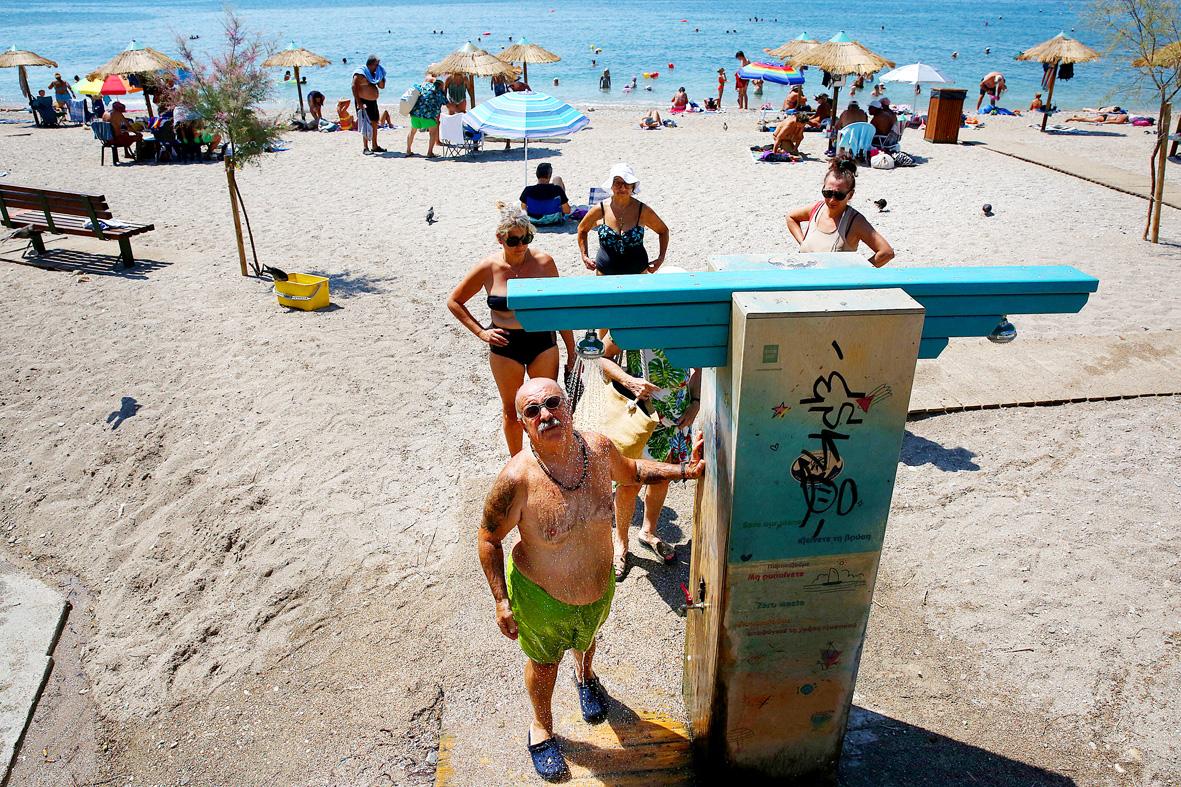Greece on Saturday concluded 12 years of EU fiscal surveillance, which was imposed in return for bailouts after a crushing debt crisis.
In November 2009, Athens revealed a sharp rise in its public deficit that eventually led to a financial crisis across the eurozone and wreaked havoc on Greek finances for a decade.
In exchange for bailout cash of 289 billion euros (US$290.1 billion at the current exchange rate) and to stop Greece from crashing out of the eurozone, a “troika,” made up of the IMF, the EU and the European Central Bank, demanded across-the-board reforms from Athens.

Photo: EPA-EFE
These included deep state spending and salary cuts, tax increases, privatizations and other sweeping reforms aimed at righting public finances.
The Greek economy contracted by more than one-quarter, unemployment spiked to almost 28 percent and skilled professionals emigrated in droves.
“A cycle of 12 years which brought pain to citizens, led to economic stagnation and divided society,” has ended, Greek Prime Minister Kyriakos Mitsotakis said. “A new horizon filled with growth, unity and prosperity emerges for all.”
“The Greece of today is a different Greece. We have recorded strong growth and a significant slide in unemployment of 3 percent since last year and 5 percent since 2019,” he added.
Ending the oversight is to strengthen Greece’s international market position by increasing its attractiveness to investors.
Athens is also to have greater control over its domestic economic policy.
“The end of enhanced surveillance for Greece also marks the symbolic conclusion of the most challenging period the euro area has experienced,” European Commissioner for Economic and Monetary Affairs Paolo Gentiloni said in a statement. “The sovereign debt crisis that defined the first years of the previous decade was a steep learning curve for our Union. Our strong collective response to the [COVID-19] pandemic indicated that Europe had learned the lessons of that crisis. We must show the same solidarity and unity as we navigate the troubled waters our economies are now entering.”
However, Greece — like fellow bailed-out EU members Spain, Portugal, Cyprus and Ireland — is still to be monitored by its creditors while paying back its debts. In Greece’s case, that is to take another two generations, with the last loans due for repayment in 2070.
According to European Commission projections, the Greek economy would grow 4 percent this year, much higher than the eurozone average of 2.6 percent.
However, Greece’s unemployment rate is one of the highest in the monetary union, its minimum wage one of the lowest and the country’s debt is 180 percent of GDP.

SEEKING CLARITY: Washington should not adopt measures that create uncertainties for ‘existing semiconductor investments,’ TSMC said referring to its US$165 billion in the US Taiwan Semiconductor Manufacturing Co (TSMC, 台積電) told the US that any future tariffs on Taiwanese semiconductors could reduce demand for chips and derail its pledge to increase its investment in Arizona. “New import restrictions could jeopardize current US leadership in the competitive technology industry and create uncertainties for many committed semiconductor capital projects in the US, including TSMC Arizona’s significant investment plan in Phoenix,” the chipmaker wrote in a letter to the US Department of Commerce. TSMC issued the warning in response to a solicitation for comments by the department on a possible tariff on semiconductor imports by US President Donald Trump’s

‘FAILED EXPORT CONTROLS’: Jensen Huang said that Washington should maximize the speed of AI diffusion, because not doing so would give competitors an advantage Nvidia Corp cofounder and chief executive officer Jensen Huang (黃仁勳) yesterday criticized the US government’s restrictions on exports of artificial intelligence (AI) chips to China, saying that the policy was a failure and would only spur China to accelerate AI development. The export controls gave China the spirit, motivation and government support to accelerate AI development, Huang told reporters at the Computex trade show in Taipei. The competition in China is already intense, given its strong software capabilities, extensive technology ecosystems and work efficiency, he said. “All in all, the export controls were a failure. The facts would suggest it,” he said. “The US

The government has launched a three-pronged strategy to attract local and international talent, aiming to position Taiwan as a new global hub following Nvidia Corp’s announcement that it has chosen Taipei as the site of its Taiwan headquarters. Nvidia cofounder and CEO Jensen Huang (黃仁勳) on Monday last week announced during his keynote speech at the Computex trade show in Taipei that the Nvidia Constellation, the company’s planned Taiwan headquarters, would be located in the Beitou-Shilin Technology Park (北投士林科技園區) in Taipei. Huang’s decision to establish a base in Taiwan is “primarily due to Taiwan’s talent pool and its strength in the semiconductor

French President Emmanuel Macron has expressed gratitude to Hon Hai Precision Industry Co (鴻海精密) for its plan to invest approximately 250 million euros (US$278 million) in a joint venture in France focused on the semiconductor and space industries. On his official X account on Tuesday, Macron thanked Hon Hai, also known globally as Foxconn Technology Group (富士康科技集團), for its investment projects announced at Choose France, a flagship economic summit held on Monday to attract foreign investment. In the post, Macron included a GIF displaying the national flag of the Republic of China (Taiwan), as he did for other foreign investors, including China-based